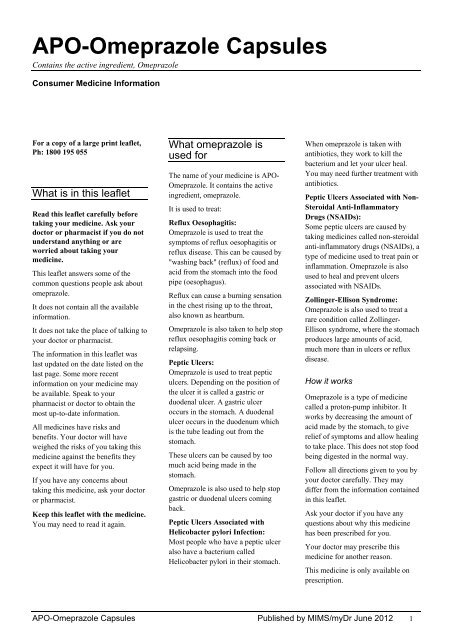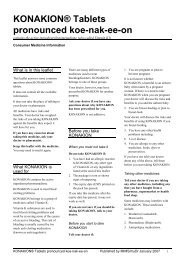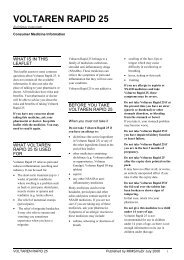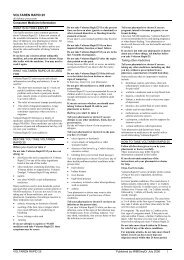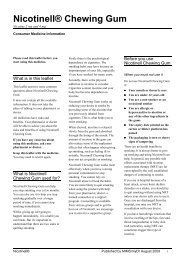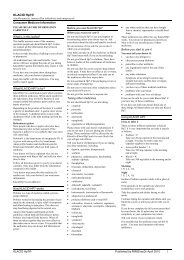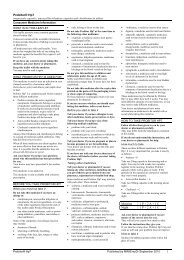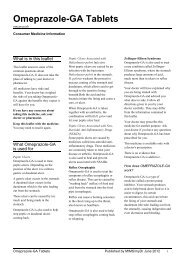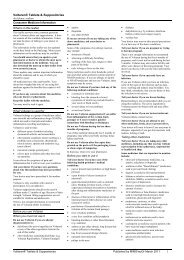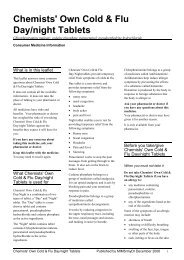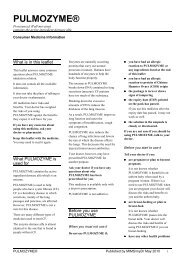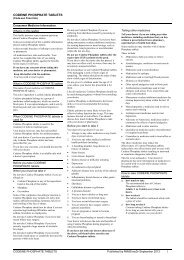APO-Omeprazole Capsules - MyDr
APO-Omeprazole Capsules - MyDr
APO-Omeprazole Capsules - MyDr
You also want an ePaper? Increase the reach of your titles
YUMPU automatically turns print PDFs into web optimized ePapers that Google loves.
<strong>APO</strong>-<strong>Omeprazole</strong> <strong>Capsules</strong><br />
Contains the active ingredient, <strong>Omeprazole</strong><br />
Consumer Medicine Information<br />
For a copy of a large print leaflet,<br />
Ph: 1800 195 055<br />
What is in this leaflet<br />
Read this leaflet carefully before<br />
taking your medicine. Ask your<br />
doctor or pharmacist if you do not<br />
understand anything or are<br />
worried about taking your<br />
medicine.<br />
This leaflet answers some of the<br />
common questions people ask about<br />
omeprazole.<br />
It does not contain all the available<br />
information.<br />
It does not take the place of talking to<br />
your doctor or pharmacist.<br />
The information in this leaflet was<br />
last updated on the date listed on the<br />
last page. Some more recent<br />
information on your medicine may<br />
be available. Speak to your<br />
pharmacist or doctor to obtain the<br />
most up-to-date information.<br />
All medicines have risks and<br />
benefits. Your doctor will have<br />
weighed the risks of you taking this<br />
medicine against the benefits they<br />
expect it will have for you.<br />
If you have any concerns about<br />
taking this medicine, ask your doctor<br />
or pharmacist.<br />
Keep this leaflet with the medicine.<br />
You may need to read it again.<br />
What omeprazole is<br />
used for<br />
The name of your medicine is <strong>APO</strong>-<br />
<strong>Omeprazole</strong>. It contains the active<br />
ingredient, omeprazole.<br />
It is used to treat:<br />
Reflux Oesophagitis:<br />
<strong>Omeprazole</strong> is used to treat the<br />
symptoms of reflux oesophagitis or<br />
reflux disease. This can be caused by<br />
"washing back" (reflux) of food and<br />
acid from the stomach into the food<br />
pipe (oesophagus).<br />
Reflux can cause a burning sensation<br />
in the chest rising up to the throat,<br />
also known as heartburn.<br />
<strong>Omeprazole</strong> is also taken to help stop<br />
reflux oesophagitis coming back or<br />
relapsing.<br />
Peptic Ulcers:<br />
<strong>Omeprazole</strong> is used to treat peptic<br />
ulcers. Depending on the position of<br />
the ulcer it is called a gastric or<br />
duodenal ulcer. A gastric ulcer<br />
occurs in the stomach. A duodenal<br />
ulcer occurs in the duodenum which<br />
is the tube leading out from the<br />
stomach.<br />
These ulcers can be caused by too<br />
much acid being made in the<br />
stomach.<br />
<strong>Omeprazole</strong> is also used to help stop<br />
gastric or duodenal ulcers coming<br />
back.<br />
Peptic Ulcers Associated with<br />
Helicobacter pylori Infection:<br />
Most people who have a peptic ulcer<br />
also have a bacterium called<br />
Helicobacter pylori in their stomach.<br />
When omeprazole is taken with<br />
antibiotics, they work to kill the<br />
bacterium and let your ulcer heal.<br />
You may need further treatment with<br />
antibiotics.<br />
Peptic Ulcers Associated with Non-<br />
Steroidal Anti-Inflammatory<br />
Drugs (NSAIDs):<br />
Some peptic ulcers are caused by<br />
taking medicines called non-steroidal<br />
anti-inflammatory drugs (NSAIDs), a<br />
type of medicine used to treat pain or<br />
inflammation. <strong>Omeprazole</strong> is also<br />
used to heal and prevent ulcers<br />
associated with NSAIDs.<br />
Zollinger-Ellison Syndrome:<br />
<strong>Omeprazole</strong> is also used to treat a<br />
rare condition called Zollinger-<br />
Ellison syndrome, where the stomach<br />
produces large amounts of acid,<br />
much more than in ulcers or reflux<br />
disease.<br />
How it works<br />
<strong>Omeprazole</strong> is a type of medicine<br />
called a proton-pump inhibitor. It<br />
works by decreasing the amount of<br />
acid made by the stomach, to give<br />
relief of symptoms and allow healing<br />
to take place. This does not stop food<br />
being digested in the normal way.<br />
Follow all directions given to you by<br />
your doctor carefully. They may<br />
differ from the information contained<br />
in this leaflet.<br />
Ask your doctor if you have any<br />
questions about why this medicine<br />
has been prescribed for you.<br />
Your doctor may prescribe this<br />
medicine for another reason.<br />
This medicine is only available on<br />
prescription.<br />
<strong>APO</strong>-<strong>Omeprazole</strong> <strong>Capsules</strong> Published by MIMS/myDr June 2012 1
There is no evidence that omeprazole<br />
is addictive.<br />
Use in children<br />
There is not enough information to<br />
recommend the use of this medicine<br />
in children.<br />
Before you take<br />
omeprazole<br />
When you must not take it<br />
Do not take omeprazole if you have<br />
an allergy to:<br />
• omeprazole<br />
• any ingredient listed at the end<br />
of this leaflet<br />
• any medicine containing a<br />
proton-pump inhibitor.<br />
Some of the symptoms of an allergic<br />
reaction may include shortness of<br />
breath, wheezing or difficulty<br />
breathing; swelling of the face, lips,<br />
tongue or other parts of the body;<br />
muscle pain or tenderness or joint<br />
pain or rash, itching or hives on the<br />
skin.<br />
Do not take this medicine after the<br />
expiry date (EXP) printed on the<br />
pack.<br />
If you take this medicine after the<br />
expiry date has passed, it may not<br />
work as well.<br />
Do not take this medicine if the<br />
packaging is torn, shows signs of<br />
tampering or if it does not look<br />
quite right.<br />
If it has expired or is damaged, return<br />
it to your pharmacist for disposal.<br />
If you are not sure whether you<br />
should take this medicine, talk to<br />
your doctor or pharmacist.<br />
Before you start to take it<br />
You must tell your doctor if you<br />
have:<br />
• allergies to any other medicines,<br />
foods, dyes or preservatives<br />
• any problems with your liver<br />
• any other medical condition.<br />
Do not take omeprazole if you are<br />
pregnant or breast-feeding unless<br />
your doctor says so. Ask your<br />
doctor about the risks and benefits<br />
involved. It is not known if it is safe<br />
for you to take omeprazole while<br />
you are pregnant. It may affect<br />
your baby.<br />
It is not known if your baby can<br />
take in omeprazole from breast<br />
milk if you are breast-feeding.<br />
Taking other medicines<br />
Tell your doctor if you are taking any<br />
other medicines including any that<br />
you buy without a prescription from<br />
your pharmacy, supermarket or<br />
health food shop.<br />
Some medicines may interfere with<br />
omeprazole. These include:<br />
• phenytoin - a medicine used to<br />
treat epilepsy or fits<br />
• warfarin - a medicine used to<br />
prevent blood clots<br />
• diazepam - a medicine used to<br />
treat anxiety and some other<br />
conditions<br />
• ketoconazole, itraconazole,<br />
voriconazole - medicines used to<br />
treat fungal infection<br />
• antiretroviral drugs (for example<br />
atazanavir and nelfinavir) -<br />
medicines used to treat viral<br />
infections such as HIV<br />
• tacrolimus - a medicine used to<br />
assist in organ transplants<br />
• Clopidogrel - known as an<br />
antiplatelet medicine, which<br />
reduces the chances of blood clots<br />
forming.<br />
These medicines may be affected by<br />
omeprazole or may affect how well it<br />
works. You may need different<br />
amounts of your medicine, or you<br />
may need to take different medicines.<br />
Your doctor can tell you what to do if<br />
you are taking any other medicines.<br />
How to take this<br />
medicine<br />
Follow all directions given to you by<br />
your doctor and pharmacist carefully.<br />
They may differ from the<br />
information contained in this leaflet.<br />
If you do not understand the<br />
instructions on the pack, ask your<br />
doctor or pharmacist for help.<br />
How much to take<br />
The dose for omeprazole varies from<br />
patient to patient. Your doctor will<br />
decide the right dose for you. This<br />
depends on your condition and<br />
whether or not you are taking any<br />
other medicines.<br />
How to take it<br />
Swallow the capsules with a glass<br />
of water.<br />
Do not crush or chew the capsules.<br />
If the granules or pellets contained<br />
in the capsules are crushed or<br />
chewed, they will not work<br />
properly.<br />
When to take it<br />
Take each dose of omeprazole at<br />
about the same time each day.<br />
Taking each dose of omeprazole at<br />
the same time each day will help you<br />
remember when to take it.<br />
<strong>Omeprazole</strong> can be taken with food<br />
or on an empty stomach.<br />
How long to take it<br />
Keep taking omeprazole for as long<br />
as your doctor recommends.<br />
If you are taking omeprazole to heal<br />
an ulcer or to treat reflux disease, you<br />
will usually need to take omeprazole<br />
for 4 to 8 weeks.<br />
It is very important that you take the<br />
full course of omeprazole as<br />
prescribed by your doctor so that<br />
your condition is properly treated.<br />
<strong>APO</strong>-<strong>Omeprazole</strong> <strong>Capsules</strong> Published by MIMS/myDr June 2012 2
If you are taking omeprazole to stop<br />
an ulcer from coming back or to treat<br />
other conditions, your doctor will tell<br />
you how long you need to take the<br />
capsules.<br />
Make sure you have enough to last<br />
over weekends and holidays.<br />
If you forget to take it<br />
If it is almost time for your next<br />
dose, skip the dose you missed and<br />
take your next dose when you are<br />
meant to.<br />
Otherwise, take it as soon as you<br />
remember, and then go back to<br />
taking your medicine as you would<br />
normally.<br />
Do not take a double dose to make<br />
up for the dose that you missed.<br />
This may increase the chance of you<br />
getting an unwanted side effect.<br />
If you are not sure what to do, ask<br />
your doctor or pharmacist.<br />
If you have trouble remembering<br />
when to take your medicine, ask your<br />
pharmacist for some hints.<br />
If you take too much<br />
(overdose)<br />
Immediately telephone your doctor<br />
or the Poisons Information Centre<br />
(13 11 26) for advice, or go to<br />
Accident and Emergency<br />
department at your nearest<br />
hospital, if you think that you or<br />
anyone else may have taken too<br />
much omeprazole.<br />
Do this even if there are no signs of<br />
discomfort or poisoning.<br />
You may need urgent medical<br />
attention.<br />
While you are taking<br />
omeprazole<br />
Things you must do<br />
Take omeprazole exactly as your<br />
doctor has prescribed.<br />
If you are about to start any new<br />
medicine, remind your doctor and<br />
pharmacist that you are taking<br />
omeprazole.<br />
Tell all doctors, dentists and<br />
pharmacists who are treating you that<br />
you are taking omeprazole.<br />
Tell your doctor immediately if you<br />
become pregnant while you are<br />
taking omeprazole.<br />
Tell your doctor if your symptoms<br />
return. Although omeprazole can<br />
heal ulcers successfully, it may not<br />
prevent them recurring at a later date.<br />
Things you must not do<br />
Do not take omeprazole to treat<br />
any other complaints unless your<br />
doctor tells you to.<br />
Do not give your medicine to<br />
anyone else, even if they have the<br />
same condition as you or their<br />
symptoms seem similar to yours.<br />
Do not stop taking your medicine<br />
or change the dosage without<br />
checking with your doctor. If you<br />
stop taking it suddenly or change<br />
the dose, your condition may<br />
worsen or you may have unwanted<br />
side effects.<br />
Side effects of<br />
omeprazole<br />
Tell your doctor or pharmacist as<br />
soon as possible if you do not feel<br />
well while you are taking<br />
omeprazole.<br />
All medicines can have side effects.<br />
Sometimes they are serious, most<br />
of the time they are not. You may<br />
need medical treatment if you get<br />
some of the side effects.<br />
Your doctor has weighed the risks of<br />
using this medicine against the<br />
benefits they expect it will have for<br />
you.<br />
Ask your doctor or pharmacist to<br />
answer any questions you may have.<br />
Following is a list of possible side<br />
effects. Do not be alarmed by this<br />
list. You may not experience any of<br />
them.<br />
Tell your doctor if you notice any of<br />
the following and they worry you:<br />
• constipation<br />
• nausea<br />
• diarrhoea<br />
• headache<br />
• skin rash.<br />
The above list includes the more<br />
common side effects. These side<br />
effects are usually mild.<br />
Tell your doctor immediately if<br />
you notice any of the following:<br />
• muscle pain or weakness<br />
• dizziness<br />
• "pins and needles"<br />
• changes in sleep patterns<br />
• mood changes<br />
• increase in breast size (males)<br />
• fever<br />
• increased bruising<br />
• signs of liver inflammation<br />
including yellowing of the skin<br />
or eyes, feeling generally<br />
unwell, nausea, vomiting, loss<br />
of appetite.<br />
These may be serious side effects<br />
that may require medical<br />
attention. Most of these side effects<br />
are rare.<br />
If any of the following happen, tell<br />
your doctor immediately or go to<br />
Accident and Emergency at your<br />
nearest hospital:<br />
• swelling of the face, lips, mouth,<br />
tongue or throat which may<br />
cause difficulty in breathing<br />
• shortness of breath or difficulty<br />
in breathing<br />
• skin reaction which may<br />
include rash, itching, redness,<br />
blistering or peeling of the skin<br />
• ulcers, blisters or bleeding of<br />
the lips, eyes, mouth, nose and<br />
genitals<br />
• swelling of feet, hands and<br />
ankles.<br />
<strong>APO</strong>-<strong>Omeprazole</strong> <strong>Capsules</strong> Published by MIMS/myDr June 2012 3
These are very serious side effects.<br />
You may need urgent medical<br />
attention or hospitalisation. These<br />
side effects are rare.<br />
Tell your doctor or pharmacist if you<br />
notice anything that is making you<br />
feel unwell. Other side effects not<br />
listed above may occur in some<br />
patients.<br />
Other problems may arise from the<br />
ulcer itself rather than the treatment.<br />
For this reason, contact your<br />
doctor immediately if you notice<br />
any of the following:<br />
• pain or indigestion that occurs<br />
during treatment with<br />
omeprazole<br />
• you begin to vomit blood or<br />
food<br />
• you pass black (blood-stained)<br />
motions.<br />
After taking this<br />
medicine<br />
Storage<br />
Keep your medicine in its original<br />
packaging until it is time to take it.<br />
If you take this medicine out of its<br />
original packaging, it may not keep<br />
well.<br />
Keep your medicine in a cool, dry<br />
place where the temperature stays<br />
below 25°C, protected from<br />
moisture.<br />
Do not store your medicine, or any<br />
other medicine, in the bathroom or<br />
near a sink.<br />
Do not leave it on a window sill or<br />
in the car.<br />
Heat and dampness can destroy some<br />
medicines.<br />
Keep it where young children<br />
cannot reach it.<br />
A locked cupboard at least one-anda-half<br />
metres above the ground is a<br />
good place to store medicines.<br />
Disposal<br />
If your doctor tells you to stop taking<br />
this medicine, or it has passed its<br />
expiry date, ask your pharmacist<br />
what to do with any medicine that is<br />
left over.<br />
Where to go for further<br />
information<br />
Pharmaceutical companies are not in<br />
a position to give people an<br />
individual diagnosis or medical<br />
advice. Your doctor or pharmacist is<br />
the best person to give you advice on<br />
the treatment of your condition.<br />
Product description<br />
What <strong>APO</strong>-<strong>Omeprazole</strong> looks<br />
like<br />
<strong>APO</strong>-<strong>Omeprazole</strong> is an opaque<br />
yellow cap and body capsule,<br />
containing off-white to cream-white<br />
spherical pellets.<br />
Each blister pack/bottle contains 30<br />
capsules.<br />
Ingredients<br />
Active ingredient:<br />
Each capsule contains omeprazole 20<br />
mg.<br />
Inactive ingredients:<br />
Pellets:<br />
• sodium lauryl sulfate<br />
• dibasic anhydrous sodium<br />
phosphate<br />
• hypromellose<br />
• mannitol<br />
• macrogol 6000<br />
• purified talc<br />
• polysorbate-80<br />
• titanium dioxide<br />
• eudragit L30-D-55<br />
• maize starch<br />
• sucrose.<br />
Capsule:<br />
• gelatin<br />
• titanium dioxide<br />
• quinoline yellow CI47005.<br />
This medicine is gluten-free, lactosefree,<br />
tartrazine-free and free of other<br />
azo dyes.<br />
Australian Registration<br />
Number<br />
• <strong>APO</strong>-<strong>Omeprazole</strong> 20 mg<br />
(blister pack): AUST R 149518.<br />
• <strong>APO</strong>-<strong>Omeprazole</strong> 20 mg<br />
(bottle): AUST R 167316.<br />
Distributor<br />
Apotex Pty Ltd<br />
66 Waterloo Road<br />
North Ryde NSW 2113<br />
Australia<br />
This leaflet was prepared in:<br />
February 2010.<br />
<strong>APO</strong>-<strong>Omeprazole</strong> <strong>Capsules</strong> Published by MIMS/myDr June 2012 4


